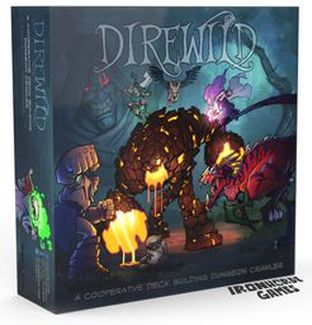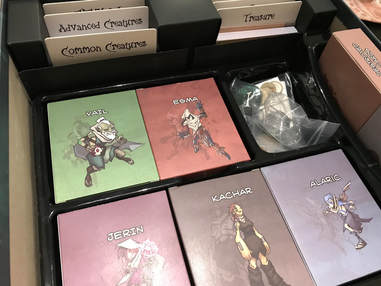 Full Disclosure: Iron Horde Games provided me with a review copy of Direwild. What is this game about? Direwild from Iron Horde Games is a cooperative deck builder, but it's also a dungeon crawler that requires tactical movement. In this game, you (and your fellow players, if you choose to accept them) are an animist with the ability to summon animals to do your bidding. One of your fellow animists, Karn, has become corrupt and power hungry, and it's up to you and your growing band of creatures to defeat him and his minions. To do so, you summon creatures, charm new ones (and add them to your deck), then combine the creatures you summoned into powerful megacreatures that can do battle with Karn and his minions. The order in which you play your cards, and the ways in which you choose to combine them, require some thought and planning. You'll also need to be aware of where your animists and their enemies are on the game board, because tactical position matters. The game takes place across three chapters, and can even be saved between chapters if you want a break. If you can use your animal card powers, magical abilities, and tactical skills to their greatest effect, you may be able to take Karn down. But this game, while beatable, is no cakewalk. You can expect to lose pretty frequently, especially while you are still learning about your powers and card synergies. How does it play solo? Direwild is officially a cooperative game for 2–4 players, but it is definitely solo-able as long as you don't mind playing two-handed. There is no hidden information or any other game element that would hinder two-handed solo play. Overall Thoughts Direwild does a lot of things that I like. I first want to give a shout out to its setup structure and rulebooks, which are extremely clear and helpful. Direwild comes with two rulebooks. The first is for setup, which is useful both when first setting up the box and when trying to save or set up new terrain during a campaign. The second is for gameplay, and it is structured in an interesting way: The rules are explained in tremendous detail on the main part of the page, but there are also margins with summary notes for people who are skimming or who just need a refresher. I really liked that, and would love to see more rulebooks follow suit.  This game is easy to organize and store. This game is easy to organize and store. As a deck builder, Direwild also introduces some interesting elements, especially when it comes to spending "charm," the in-game currency that is used to add creatures from the market row to your deck. Unlike other deck builders, in which leftover currency frequently goes unspent, Direwild allows you to make the most of your charm by using the leftovers for a number of purposes, such as putting a new card on top of your deck instead of in discard, eliminating a creature from the market row, or using charm to clear out "locks" that can be removed to give access to the advanced creatures deck, as well as powerups that come in handy later in the game. I liked that all of my charm felt useful, even if I couldn't make the exact purchases I was hoping for. However, Direwild is not quite a perfect game. It has some pacing issues that reveal themselves after multiple plays—even with the option to save between rounds, a full game feels a little bit long. And within individual rounds, it can be very difficult to build your deck as quickly and efficiently as you need to. If you get unlucky and keep drawing low-charm cards, you can really miss out, especially on advanced creatures. And because combat is all-or-nothing—you either win and deal damage or lose and take some—you can have frustrating and wasted turns if you need to fight but don't draw the right hand. To compound these issues, there also aren't enough options available to trim your deck, especially if the right cards don't appear on the market. That means your deck stays clogged with more weak cards than it ought to, especially in the later stages of the game. There is a certain tightness that Direwild is lacking, for all of its good ideas, and that prevents it from fully taking flight. It is, however, Iron Horde's first game, and I will be very interested in whatever they do next. Do I recommend it? I recommend trying it, but not necessarily buying it. If you really love deck builders and the theme is a strong draw for you, odds are you will have a good time with it. Overall Rating: 3.5 stars Rating Scale: 5 stars — I love it! 4 stars — I really like it. 3 stars — I like it. 2 stars — It's okay. 1 star — Meh.
1 Comment
K Petoussis
7/1/2019 03:17:03 am
I did some proofreading of the manual, and have the game. I do understand that it might not click immediately with some gamers. It is a deep game that requires players to reason on it. Haven't beaten it yet.
Reply
Your comment will be posted after it is approved.
Leave a Reply. |
AuthorMy name is Liz Davidson, and I play solo board games. A lot of solo board games... Archives
August 2021
Categories
All
|
 RSS Feed
RSS Feed